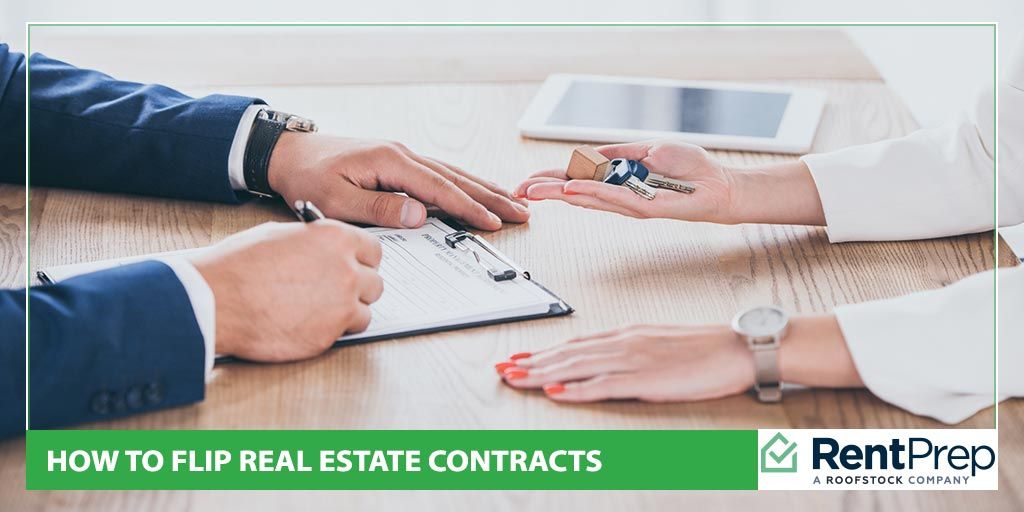
Property owners and landlords utilize various investment strategies to grow their portfolios and businesses. For many, learning how to flip real estate contracts was a significant step along the way.
Flipping contracts in real estate, also known as wholesaling, enables those without much free capital to get involved in the flipping market differently. While this method requires less upfront investment, that doesn’t necessarily mean it’s easier than more traditional investment methods. Making money with this tactic requires a lot of hard work.
Do you want to know how to start flipping real estate contracts? Find out if this real estate investment method fits your growth plans in today’s guide on flipping contracts.
A Table Of Contents On Flipping Contracts In Real Estate
Investors who flip real estate contacts combine their research, networking, and negotiating skills to make a profit. Do you have the right skills for this technique? Find out today:
- What Is Flipping Contracts In Real Estate?
- How To Flip Real Estate Contracts: Beginner’s Guide
- FAQs On How To Flip Real Estate Contracts
- Flip Real Estate Contracts: Is This Strategy For You?
What Is Flipping Contracts In Real Estate?

Flipping real estate contracts is a type of investment strategy used to make money without purchasing a property. Rather than buying the property and then reselling it at a profit, the investor works to connect discounted properties with interested investors.
After acting as a middleman and networker in this deal, the investor is paid a lump sum for the contract exchange. This payment is a bit like a finder’s fee; the investor is paying you to help connect them to the property.
This method is also known as wholesale real estate or wholesaling. During specific investment booms, wholesaling gained widespread popularity for being a good starting point for investing if you didn’t have much free capital to work with.
Despite being advertised as a good starter investment, that doesn’t mean flipping real estate contracts is easy. Flipping contracts requires you to grow a network of connections while also maintaining a strong knowledge of your local markets. You may not need to have much free capital, but you do need to develop the right skillset.
How To Flip Real Estate Contracts: Beginner’s Guide
How exactly does flipping real estate contracts work? Let’s move through the process from start to finish to give you a broader view of how this method works and how it might fit your business model.
Step 1: Find The Right Property
In the modern market, finding the right property can be the most challenging part of the flipping process for many investors. Identifying properties that are on the market at low prices, or not yet on the market but headed that way, takes a lot of market knowledge and foresight.
The key to success is locating motivated sellers. Whether you find investors who got in over their heads with a bad flip or sellers who are looking to move fast, you need to find property owners who want to get out of their current situation. This urgency will help with negotiations.
Some investors look to courts to find default filings as this is typically part of public record. Checking these records regularly can help you find opportunities to work on a real estate contract flip before others get to the same properties. It’s possible to buy lists of these houses, but doing the legwork yourself will give you a headstart in most scenarios.
Step 2: Determine The Value
The only way to make money while flipping contracts is to ensure that the property is under market value but can be flipped to a considerably higher value. If the property cannot see this type of change at a reasonable repair cost, the property isn’t a good choice.
Analyze your local markets in great detail. Keep an eye on recently flipped properties to determine the area’s costs and profits. Dig into the footprints and necessary repairs in comparable homes to better estimate repair costs.
Every part of the property plays a role in how interested an investor will be and what type of value the property has. Finding an investor to take on your contract will be nearly impossible without the details.
You’ll want to determine the most an investor is likely to pay for a property. Consider using the MAO, or maximum allowable offer, formula. Many investors use this formula to determine their own investment strategy.
To calculate MAO, simply multiply the maximum after-repair value by 70%. Subtract the cost of repairs from this number, and then you have the maximum allowable offer. This is the most that you should expect to be offered by an investor.
Step 3: Negotiate The Contract
Once you’re in contact with the owner and have explained your desire to work with them to sell the property, you’ll need to work together to negotiate the contract terms. Owners may be hesitant to talk about selling their property, but you can work with them to find the correct terms for them to move forward.
As you set up the contract, ensure that every detail is precise and no ambiguity is left in the contract terms. Ambiguity only leads to problems in these situations, so you want to be as clear as possible. Ensure that the intentions to resell the contract are clear for all parties involved, and consider getting an experienced attorney to look over the contract details before signing.
Once the contract is signed, you can assign the agreement to an interested investor.
Step 4: Find The Buyer

Many wholesalers already have potential buyers in mind when they start negotiating a flipping contract. This helps reduce overall risk, but you typically wouldn’t involve a buyer until this stage.
Market the property to investors. Highlight the potential of the property. Present the details gathered during your research on the property’s value, and show investors what they can gain from it.
You can find the right buyer in less than a day, depending on your contacts. Grow your list of potential investors so you have a good list of potential buyers at all times.
Step 5: Close And Collect
Once you’ve identified the right buyer, it’s time to close the deal. Bring in an experienced title company that has worked with wholesale buyers before. This will enable you to move smoothly through the process. The title company will close the deal between the buyer and seller, and the buyer will pay you the assignment fee for your services.
Example Scenario
Let’s run through an example scenario to help gain a deeper understanding of how wholesaling works.
First, you find an outstanding, undervalued property. Once fixed up, it’s likely to sell for around $300,000, though the repairs may cost around $25,000. You can use this information to calculate how much an investor might be willing to pay for the property.
Using the MAO formula (maximum allowable offer = (after-repair value * .7) – repair costs), you determined that an investor will likely pay up to $185,000. If you can negotiate a contract with the property owner for $175,000, you can take home $10,000 when the deal goes through.
Remember: Keep Updated With Your Knowledge
The best way to find continued success, whether wholesaling, managing rental properties, or engaging in another investment strategy, is to keep learning. You fall behind when you stop learning about your local market and the industry at large.
We know the importance of learning for both new and experienced landlords. Our blog is consistently updated with various informational guides that often include sample forms and documents you can use to grow your business.
Check out what knowledge we’re sharing on our blog, and sign up for the newsletter to stay up-to-date with the latest in the rental and real estate world.
FAQs On How To Flip Real Estate Contracts
It’s natural if you still have questions; there’s so much to learn about flipping real estate contracts. Review these FAQs to keep learning.
Is flipping real estate contracts profitable?
Real estate contract flipping profitability depends on your arrangements with buyers and sellers. There isn’t a specific limit to how much can be made with this technique, but there isn’t a guarantee you’ll complete a deal.
The profitability depends on how many contracts you can transfer and how skilled you are at making the right property evaluations. Closing wholesale deals takes time, and time invested cuts into how much profit you take home.
Most real estate contract flippers make a few thousand dollars for each completed transfer. The exact amount will vary depending on your negotiations with the end buyer. As you build a stronger relationship with investors acting as end buyers, you’ll be able to create a steady flow of income from wholesaling.
Is flipping real estate contracts hard?
Flipping real estate contracts is a complex process. Managing real estate contract flips alongside the rest of your rental portfolio can be complicated.
It takes many deals to become experienced in this field, and there is a lot to learn as you analyze local markets, repair costs, property value, and more. Like all real estate-adjacent fields, the scene is constantly changing, so you must keep up with the latest news.
It’s also necessary to stay informed about what you can and cannot do in your area. For example, Illinois is one of the only states that require investors wholesaling real estate contracts to have a real estate license. You cannot simply start this practice in Illinois without becoming licensed.
Is flipping a real estate contract the same as flipping a house?
No. Flipping a real estate contract is different from flipping a house or property.
When flipping a house, you purchase the property. After making repairs to the property, you resell it in hopes of making a profit. That is how income is generated when flipping a property.
Flipping a real estate contract is different. In this scenario, you never purchase the property. Instead, you sign a deal with the owner to buy the property. Then, you transfer that deal to an interested investor. You are paid an assignment fee for your services, which you can think of as a finder’s fee paid by the investor.
How much money is needed to flip contracts?
Money is not technically needed to flip real estate contracts at the base level. A purchase contract typically requires a payment to be completed, but it can sometimes be as little as $10. Owners needing more clarification about the wholesaling process may request a larger payment, which can change how much money is required.
Unlike other types of investment, however, you don’t need the funds to pay down or purchase a property in full. Since you are transferring the purchase contract to another individual, you are not responsible for paying those costs. This is why it’s easier for those without a significant income to invest through wholesaling than other means.
Flip Real Estate Contracts: Is This Strategy For You?
Now that you know how to flip real estate contracts, you have a better idea of whether or not this investment strategy will benefit your business goals. With this strategy, you don’t have to take on more properties to manage full time. It allows you to move on to the next negotiation without having more to manage long term.
Remember that there are some major steps to work carefully through as you work on flipping real estate contracts:
- Finding properties that make sense for selling contracts to investors
- Connecting with investors that need properties and are willing to pay you for finding good properties
- Utilizing your negotiation skills to set up a deal that makes both parties happy and pays you well
Flipping real estate contracts is not your traditional type of real estate investment by any means. There is some overlap in the skills used in conventional and wholesale investing, but they are put to use much differently. If you decide to give real estate contract flipping a try, remember that you may need to try a new perspective to find success.

